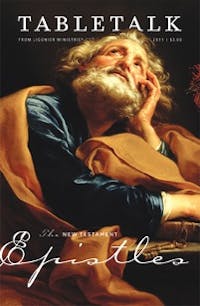
Request your free, three-month trial to Tabletalk magazine. You’ll receive the print issue monthly and gain immediate digital access to decades of archives. This trial is risk-free. No credit card required.
Try Tabletalk NowAlready receive Tabletalk magazine every month?
Verify your email address to gain unlimited access.
Neil Postman, in his delightful albeit ominous book Amusing Ourselves to Death, draws an insightful comparison between two important dystopian novels. Utopian novels, of course, are those designed to show us edenic cultures. Dystopian novels show us hellish futures.
The two Postman discusses are 1984 by George Orwell and the slightly lesser known Brave New World by Aldous Huxley. Both books alarm us, but in different ways. The citizens of 1984 are haunted and hunted by Big Brother, the embodiment of the statist dictator. Every moment of every day is both regimented and watched by the repressive state. In Brave New World, however, the citizens are, in a certain sense, not at all oppressed. They don’t live in fear of the state. They are enslaved more by the carrot of pleasure and entertainment, while in 1984 they are enslaved by the stick of torture and the secret police. What if, Postman asks, we were all on our guard for 1984, but what snuck up on us was Brave New World?
Winston, the “hero” of 1984, works as a bureaucrat at the Ministry of Truth. He is both a censor and a revisionist historian. The past is changed to fit the needs of the regime, and truth is sent to burn up in the memory hole. One of his friends has a slightly different job — culling the nation’s dictionary. Here the goal isn’t merely to rid the book of outmoded words but to rid the language of dangerous thoughts. By whittling the language down, the state can whittle away the capacity of its citizens to even think in terms of freedom and liberty. Is it possible that all our communication conveniences in our so-called “Information Age” are, in a manner of speaking, an assault on language and liberty, but from the perspective and approach of Brave New World? Have we, with emails, tweets, and texts 4gotn how 2 thnk? Have we entered a brave new world not with our fingers in our ears but our thumbs on our keypads?
Postman argues persuasively that levels of discourse can certainly rise or fall, and that such may be the fruit of given technologies. His argument is that with the advent of television, we ceased to be a word-based culture and rapidly became an image-based culture. Images, as a medium, are much better than words at evoking emotions. They are much less effective than words at communicating abstract ideas. I recall realizing just how dumbed-down our culture had become while a student in seminary. One of the key books we were assigned to read for our systematic theology course was The Institutes of the Christian Religion by John Calvin. I read both volumes, finding them rich, helpful, but by no means an easy and comfortable read. I was ashamed, however, to consider Calvin’s goal in writing this work — it was designed to be a primer, a basic introduction to the Christian faith for laypeople. And there I was not only reading it as a text in my seminary but finding it among the more difficult books in the whole of my studies.
Perhaps stranger even than our growing ignorance is our concomitant growing confidence in our wisdom. Instead of looking to the ancients as our betters, we see them as hopelessly undereducated rubes. Reading the epistles in the Bible, however, ought to disabuse us of our foolish pride. We might be tempted to escape this conclusion by remembering our doctrine of inspiration. Paul, Peter, John, all the authors of all the epistles had some rather potent help along the way. When the omniscient God of heaven and earth is superintending your writing, you can certainly reach depths of wisdom that you would not have reached on your own. Communication, however, is a two-way street. What we learn from reading the epistles is not just the brain power behind the writing of them, but the brain power behind the reading of them. Like Calvin’s Institutes, the New Testament epistles were written by and large for laypeople, pew sitters, regular folk.
The readers of these letters, while they were certainly blessed to have pastors and teachers to help them understand, likely did not sit down over the course of a year or three to dissect these letters, word by word. They didn’t spend a month of Sundays on 1 Corinthians 1:1a, before daring to move on the next month to 1:1b. Instead, they received these letters as letters. They understood them as letters. They submitted to them as letters.
As education gadfly John Taylor Gatto has wisely argued, we are being dumbed down by our own state school systems. That is 1984. But we are also dumbing ourselves down by refusing to sit, be still, and to read reasoned discourse that moves sequentially from one thought to the next, communicated in complete sentences. That is our Brave New World. Our calling then is not to live as the citizens under 1984. Nor should we see ourselves as the vapid consumers of Brave New World. Instead we are called to seek first a different kingdom. Instead we are to seek His righteousness. We find both in the Word of Him who is the Word. May we drink deeply of that Word, that we might walk rightly with that Word.
